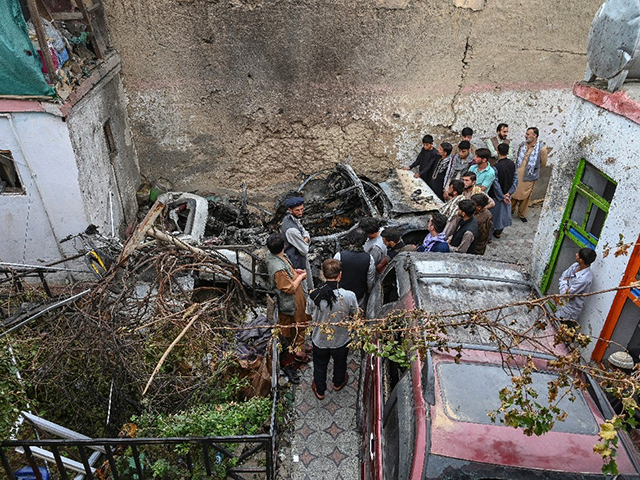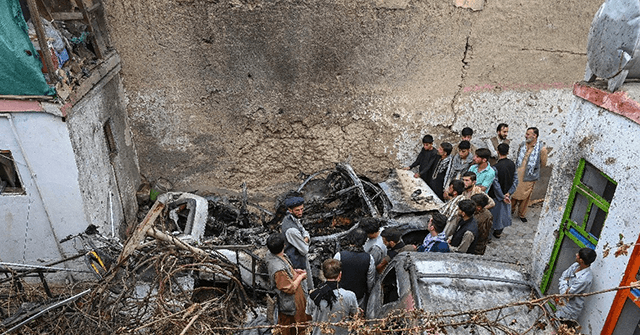

Kabul resident Ramal Ahmadi on Friday demanded explanations from the Biden administration for the August 29 drone strike that reportedly killed ten members of his family, six of them children.
Senior U.S. military officials insist the strike targeted a vehicle packed with explosives and at least one Islamic State operative was present at the scene.
The Sunday strike occurred three days after the Islamic State in Afghanistan, frequently referred to as ISIS-K, claimed responsibility for a suicide bomb attack on Hamid Karzai International Airport that killed over 200 people, including 13 American servicemembers.
The Associated Press (AP) quoted Pentagon officials, including Joint Chiefs of Staff Chairman Mark Milley, who insisted the drone strike appropriately targeted an ISIS “facilitator” who appeared to be preparing another “imminent” attack on the Kabul airport.
The Pentagon suggested the massive explosion that killed the Ahmadi family was a “secondary” blast that proved the car was filled with bombs. Anonymous “U.S. officials” told the AP they watched the drone video feed as the strike was in progress and saw explosives being loaded into the car.
“This strike prevented a high-profile attack against both coalition and U.S. forces, as well as Afghan civilians. The decision was made to strike and thwart that attack,” Maj. Gen. William “Hank” Taylor said from Washington on Monday.
Ramal Ahmadi, on the other hand, claims his older brother Zemari had just pulled into the small courtyard of the family home in his Toyota Corolla after returning from work. Several family members, including children, ran out to greet him and were killed when the car exploded from the drone strike. The Ahmadi family said five of the casualties were younger than five years old. Three of them were Ramal’s children, ages 5, 3, and 1 and a half.
“They have to give us answers. Is our blood so worthless, we don’t even get an explanation?” Ramal said to the AP.
His surviving brother Emal pointed to two undetonated gas cylinders in the courtyard and asked, “If the car was filled with explosives like the Americans say, why didn’t these cylinders explode? How could the wall still be standing if this car had been full of explosives?”
Emal angrily denied accusations that Zemari or other members of his family were members of ISIS-K. “If you have proof, I say, ‘Go ahead, kill me.’ But show me the proof,” he said.
The family said Zemari was working for a California-based NGO called Nutrition & Education International (NEI) and would more likely have been a target of ISIS-K than a collaborator. Email claimed Zemari had applied for permission to emigrate to the United States, like many other Afghans who worked for Western governments or organizations prior to the Taliban takeover.
NEI president and CEO Steven Kwon on Monday described Zemari to the L.A. Times as a “very kind-hearted and very caring person,” a “dedicated man” who was “very respected and loved” in Kabul.
The family further stated that 25-year-old Nasser Ahmadi, Zemari’s nephew, “had worked with U.S. special forces in the western Afghan city of Herat, and had also served as a guard for the U.S. Consulate there before joining the Afghan National Army.” They said Nasser was staying at the house in Kabul because he, too, was seeking permission to emigrate to the United States.
“I want Joe Biden to know about this. Why do you attack these people and say it’s Daesh?” a relative of the deceased named Mohammad Fawad told the L.A. Times. Daesh is another name for the Islamic State.
“All of these kids were martyred. Look at them. Which one of these people is Daesh? These people worked with the government – with the U.S. And look at these kids. Do you think they’re Daesh?” he asked, flipping through photos of the children on his phone.
The L.A. Times attended a hilltop funeral service for six of the slain Ahmadi family on Monday:
As the last coffins arrived, the crowd turned angry. Some raised printed signs accusing the U.S. of committing a crime.
“America is the killer of Muslims in every place and every time,” said Jamshid Mejrabi, a 35-year-old relative of the family. “I hope that all Islamic countries unite in their view that America is a criminal.”
As he spoke, an F-18 Hornet jet fighter circled overhead.
“We’re now much more afraid of drones than we are of the Taliban,” said a colleague of Ahmadi’s, who did not want his name published for security reasons. He had gotten lost on the way to the funeral but kept on hearing the jets.
The UK Independent on Friday claimed to have seen “references for visas and P2 referrals from [the Ahmadi family’s] employers and supervisors, past and present, show that they were facing threats from the Taliban and were in danger.”
Zemari Ahmadi’s P2 papers, the form used to request immediate emergency evacuation, were allegedly being processed by his employer Steven Kwon of NEI.
The Independent also viewed a recommendation letter from the U.S. military for Nasser Ahmadi recommending prompt approval for his Special Immigration Visa (SIV). The letter described his services as “dedicated” and “superb,” and said he and his family were in “grave danger” because of his “commitment to American and NATO forces.”
“The U.S. seems to have had no idea the children and family were in the vicinity. It begs the question of just how good the intelligence they acted upon was,” Jennifer Gibson, an American lawyer working with the British human rights group Reprieve, remarked to the Independent.
The White House said on Thursday that reports of civilian casualties from the drone strike will be investigated, and insisted U.S. plans to strike terrorist targets in Afghanistan would not be abandoned.
Related posts:
Views: 0
 RSS Feed
RSS Feed

















 September 4th, 2021
September 4th, 2021  Awake Goy
Awake Goy  Posted in
Posted in  Tags:
Tags: 
















